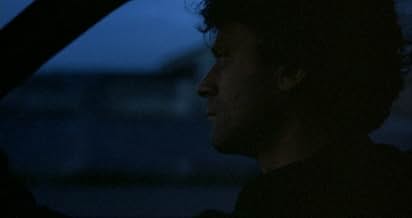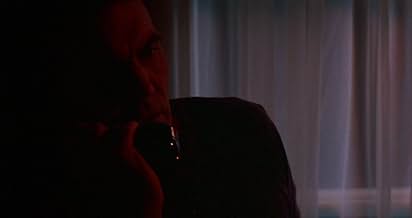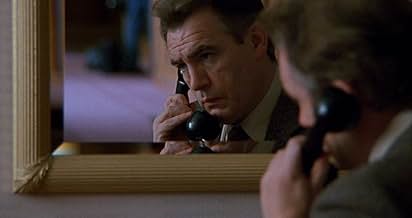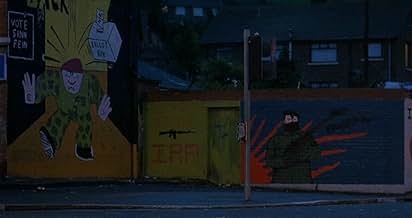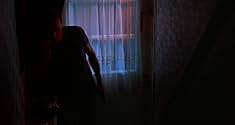IMDb RATING
6.9/10
5K
YOUR RATING
When an American human rights lawyer is assassinated in Belfast, it remains for the man's girlfriend, as well as a tough, no nonsense, police detective to find the truth.When an American human rights lawyer is assassinated in Belfast, it remains for the man's girlfriend, as well as a tough, no nonsense, police detective to find the truth.When an American human rights lawyer is assassinated in Belfast, it remains for the man's girlfriend, as well as a tough, no nonsense, police detective to find the truth.
- Awards
- 2 wins & 3 nominations total
- Director
- Writer
- All cast & crew
- Production, box office & more at IMDbPro
Featured reviews
The distinctly pedestrian and realist style to this little caper was quite refreshing as it avoided most clichés of the thriller genre like sexy protagonists and high energy gun battles etc etc to give something a little like a racy cigarette smoke-filled real-life documentary. The miry setting, in the midst of the sectarian wars of Ireland, and including within the tawdry bowels of the Royal Ulster Constabulary, also Republican bars, minor hotels, and humble households was most intriguing, but then the 'hidden agenda' plot panned away some distance from the psycho-realism onto a rather disappointing vein about incredulous or just uninteresting high level parliamentary dirty tricks, ho hum... Thatcher (of course), well not her exactly, anyway... It felt great in the main though, in the unique way the drama was directed, somewhat over the shoulder camera positions where the context is always in view, and conjuring easy naturalistic performances - with Cox doing a great turn as kind of big Yorkshire terrier. The story muddled its way along in a way that felt pretty convincing as a slice of real life in all its convolutions and routine failures of trust, up until the final segment which as I say pulled back I feel a little far, with its ambition to be a big Political thriller, somewhat betraying the best bit, the human narrative of the everyday fog of war and enduring terror that was no doubt an everyday reality for the citizens of northern Ireland.
Hidden Agenda (1990) is a somewhat enjoyable political cover-up drama about the Northern Ireland conflict (the troubles). Starring Brian Cox and the ever wonderful Frances McDormand. Somewhat enjoyable is about as good as it gets though sadly. Very interesting history and plot, well written and well acted but drawn-out and one sided.
Whooaa! Slow down, sol1218 from Brooklyn NY.
The political scene in the U.K. looked like this: Edward Heath, bachelor leader of the Conservatives, won the election in 1970. He took Britain into the then Common Market in 1973, but called an election in February 1974 when the miners forced him to declare a three-day week.
The Tory slogan for the election was: Who governs Britain? The result was confused, but the message was fairly clear: Not you, matey. Labour under Harold Wilson took office with a slim majority. Wilson called a second election in October, which he won narrowly, increasing his majority slightly.
He held a referendum on the Common Market in 1975, which he won by sidelining the extremists of both Left and Right. He ruled until 1976 when he resigned from politics, for reasons which were obscure at the time, but probably because he had been diagnosed with Parkinson's. It is certainly true that the Right plotted endlessly against him.
Jim Callaghan, who had been Chancellor, Home Secretary and Foreign Secretary, took over as P.M. and called an election after his full five-year term. (In the U.K. governments normally call elections after four years.) In fact Callaghan was forced to do so because of a move by the Scottish Nationalists. Had he called the election just a year earlier, he stood a good chance of winning, say many pundits.
Meanwhile, the Conservatives had deposed Edward Heath who had lost them two elections, and Maggie Thatcher replaced him as leader. She swept to power in 1979, and as we all know, won the next two elections.
Economic chaos was the watchword of the day and there were many strikes. The situation in Northern Ireland, which had started simmering with the Civil Rights movement of 1968, gradually deteriorated. The assassinated politician of the film whose name is Nevin, may well represent Airey Neave, a war hero who had escaped from the high-security Colditz Castle, a German-speaking lawyer who had attended the Nuremberg Trials and a hardline Conservative with military and security connections, who was a close adviser of Thatcher. He was blown up outside the House of Commons on March 30, 1979, by the INLA a few weeks before the election.
Ken Loach has never made any secret of his sympathies for the Irish cause. His powerful film "Wind that shakes the barley", which apparently did not make much money in the U.K., had Conservative politicians fulminating about treason and lack of patriotism because of his portrayal of the brutal Black and Tans. The name was given to the ex-British army personnel and (inaccurately) also to the auxiliaries who were sent to Ireland between 1920 and 1921 to crush the IRA and Sinn Fein, but who also attacked and killed civilians. Historians agree, however, that Loach was pretty accurate in his historical recreation. The film also shows the ruthlessness of Irish-on-Irish killings in the Civil War afterwards.
The political scene in the U.K. looked like this: Edward Heath, bachelor leader of the Conservatives, won the election in 1970. He took Britain into the then Common Market in 1973, but called an election in February 1974 when the miners forced him to declare a three-day week.
The Tory slogan for the election was: Who governs Britain? The result was confused, but the message was fairly clear: Not you, matey. Labour under Harold Wilson took office with a slim majority. Wilson called a second election in October, which he won narrowly, increasing his majority slightly.
He held a referendum on the Common Market in 1975, which he won by sidelining the extremists of both Left and Right. He ruled until 1976 when he resigned from politics, for reasons which were obscure at the time, but probably because he had been diagnosed with Parkinson's. It is certainly true that the Right plotted endlessly against him.
Jim Callaghan, who had been Chancellor, Home Secretary and Foreign Secretary, took over as P.M. and called an election after his full five-year term. (In the U.K. governments normally call elections after four years.) In fact Callaghan was forced to do so because of a move by the Scottish Nationalists. Had he called the election just a year earlier, he stood a good chance of winning, say many pundits.
Meanwhile, the Conservatives had deposed Edward Heath who had lost them two elections, and Maggie Thatcher replaced him as leader. She swept to power in 1979, and as we all know, won the next two elections.
Economic chaos was the watchword of the day and there were many strikes. The situation in Northern Ireland, which had started simmering with the Civil Rights movement of 1968, gradually deteriorated. The assassinated politician of the film whose name is Nevin, may well represent Airey Neave, a war hero who had escaped from the high-security Colditz Castle, a German-speaking lawyer who had attended the Nuremberg Trials and a hardline Conservative with military and security connections, who was a close adviser of Thatcher. He was blown up outside the House of Commons on March 30, 1979, by the INLA a few weeks before the election.
Ken Loach has never made any secret of his sympathies for the Irish cause. His powerful film "Wind that shakes the barley", which apparently did not make much money in the U.K., had Conservative politicians fulminating about treason and lack of patriotism because of his portrayal of the brutal Black and Tans. The name was given to the ex-British army personnel and (inaccurately) also to the auxiliaries who were sent to Ireland between 1920 and 1921 to crush the IRA and Sinn Fein, but who also attacked and killed civilians. Historians agree, however, that Loach was pretty accurate in his historical recreation. The film also shows the ruthlessness of Irish-on-Irish killings in the Civil War afterwards.
Not top-drawer Ken Loach; the "thriller" elements are well-done, but the warmth and depth Loach brings to his working-class stories has no place here. There's a structural flaw in the script, too--it presents itself as a film about Northern Ireland but then jumps headlong into something equally involving but quite different.
It is, all the same, a well-crafted, atmospheric film that never lacks excitement and raises some substantial issues. More importantly, the entire film is sadly prescient. The opening torture narratives could have been translated from accounts of Abu Ghraib prison. Change a couple of proper names and the scenery, and this would be the best film around on the U.S. occupation of Iraq. Even the second half of the story (no spoiler warning, so I give no details) rings truer and truer as time goes by.
Richly deserves reissue.
It is, all the same, a well-crafted, atmospheric film that never lacks excitement and raises some substantial issues. More importantly, the entire film is sadly prescient. The opening torture narratives could have been translated from accounts of Abu Ghraib prison. Change a couple of proper names and the scenery, and this would be the best film around on the U.S. occupation of Iraq. Even the second half of the story (no spoiler warning, so I give no details) rings truer and truer as time goes by.
Richly deserves reissue.
Largely forgotten today, the first of two films Ken Loach made about The Troubles generated headlines at the time for a nasty spat at a press conference between Alexander Walker and Loach. As the snappy title suggests it's the nearest thing Loach ever made to a conventional thriller, and although Loach is no Costa-Gavras or Alan Pakula it hold the attention.
Loach inevitably subscribes to the conspiracy rather than the cock-up theory of history, witness the speech that Thatcher's elevation was deliberately engineered rather than simply luck; and he puts a crass and patronising observation about the Irish in a high-ranking Tory's mouth.
A good cast rather surprisingly includes Mai Zetterling making a rare late appearance as an actor in a oddly small part.
Loach inevitably subscribes to the conspiracy rather than the cock-up theory of history, witness the speech that Thatcher's elevation was deliberately engineered rather than simply luck; and he puts a crass and patronising observation about the Irish in a high-ranking Tory's mouth.
A good cast rather surprisingly includes Mai Zetterling making a rare late appearance as an actor in a oddly small part.
Did you know
- TriviaThe 'Six Irishmen,' mentioned by Sir Robert Neil of MI5 (with politician Alec Nevin) to Kerrigan is in reference to the 'Birmingham Six.' In 1974 the pub Tavern In The Town and Mulberry Bush, in Birmingham England, was bombed, killing 21 persons and injuring 182 people. The police picked up the nearest six Irishmen and subjected them to 'in-depth interrogation' to obtain false confessions. Patrick Hill, Gerard Hunter, Richard McIlkenny, William Power, John Walker and Hugh Callaghan all served 16 horrific years in jail until the convictions were overturned in 1991. Hugh Callaghan details his ordeal in the book, *Cruel Fate,* co-authored with Sally Mulready in 1994-1995. The movie Au nom du père (1993), was based on the Guildford Four, who were similarly jailed using false confessions, along with members of their extended family living in London. That's how the Brits induced Gerry Conlon, Daniel Day-Lewis' character, to confess, by throwing his father, aunts, uncles, and cousins in jail, too. Members of the Guildford Four ordeal were released in 1989 and 1991, where illegal police tactics and hidden evidence were brought to light. The appeals trials of the Guildford Four paved the way for the release of the Birmingham Six, who were in jail longer, and their pleas for appeals were ignored, and never heard until after the Guildford Four / Conlon Family convictions were finally thrown out. All of the innocent Birmingham Six and Guildford Four were still in jail at the time this movie was released.
- Quotes
Sir Robert Neil: You know Ireland can be a wonderful place... if it wasn't for the Irish!
- SoundtracksJoe McDonnell
Written by Brian Warfield
Re-arranged by Ron Kavana
Performed by Ron Kavana and Terry Woods
Published by Skin Music
- How long is Hidden Agenda?Powered by Alexa
Details
Box office
- Gross US & Canada
- $1,030,938
- Opening weekend US & Canada
- $49,827
- Nov 25, 1990
- Gross worldwide
- $1,232,210
- Runtime
- 1h 48m(108 min)
- Color
- Sound mix
- Aspect ratio
- 1.85 : 1
Contribute to this page
Suggest an edit or add missing content


